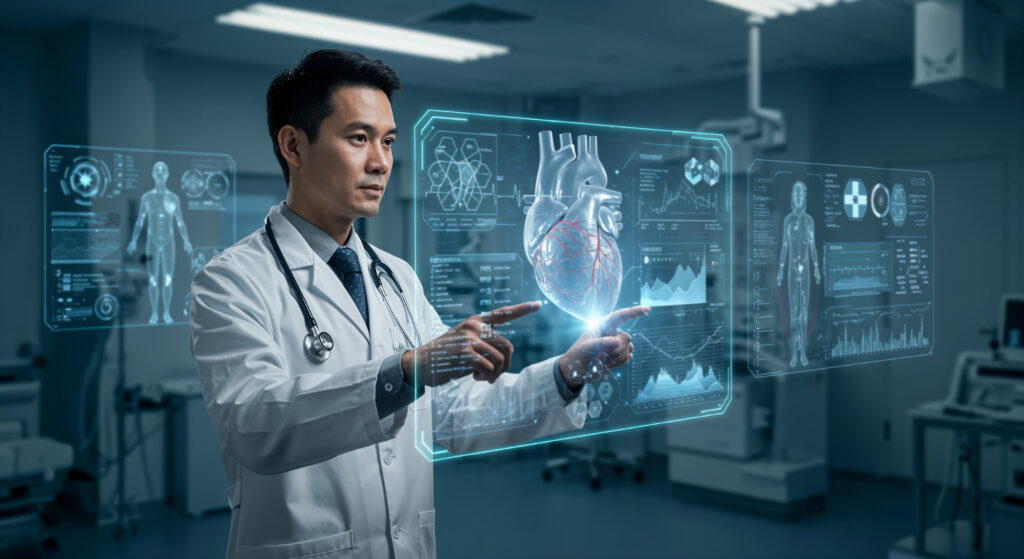Artificial intelligence (AI) in healthcare is no longer a futuristic concept—it is a reality shaping hospitals, diagnostics, patient care, and the global healthcare industry. From predicting diseases early to enhancing clinical decision-making, AI-powered systems are revolutionizing how doctors, pat/ients, and medical organizations operate. With the increasing adoption of AI tools, the AI in healthcare market is witnessing rapid growth, driven by innovation, demand for better outcomes, and the global digital health transformation.
In this blog, we’ll explore the applications, advantages, and market potential of AI in healthcare, along with some frequently asked questions.
What is Artificial Intelligence (AI) in Healthcare?
Artificial intelligence (AI) in healthcare refers to the use of machine learning, natural language processing, robotics, and predictive analytics to support medical professionals in delivering accurate, efficient, and personalized care. By analyzing vast amounts of data—from electronic health records (EHRs) to diagnostic imaging—AI systems help reduce human error, speed up processes, and improve patient outcomes.
Applications of AI in Healthcare
- Diagnostics and Imaging
AI is widely used in radiology and pathology to detect anomalies in X-rays, MRIs, and CT scans. Algorithms can identify cancerous cells or cardiovascular risks faster and often more accurately than traditional methods. - Drug Discovery and Development
Pharmaceutical companies are leveraging AI to accelerate drug development, identify new molecules, and repurpose existing drugs. This significantly reduces the time and cost involved in bringing medicines to market. - Virtual Health Assistants
AI-powered chatbots and voice assistants provide patients with round-the-clock support—answering health queries, booking appointments, and monitoring chronic conditions remotely. - Predictive Analytics in Patient Care
Hospitals use AI to predict patient deterioration, readmission risks, or sepsis development. Early intervention improves survival rates and reduces healthcare costs. - Robotics in Surgery
Robotic-assisted surgeries powered by AI offer precision, faster recovery times, and minimal invasiveness, improving surgical success rates.
Advantages of AI in Healthcare
The adoption of artificial intelligence (AI) in healthcare brings several benefits:
- Improved Accuracy: AI algorithms detect patterns and anomalies beyond human capability, reducing diagnostic errors.
- Cost-Effective Care: Automation in administration and diagnostics reduces operational costs.
- Faster Decision-Making: Doctors can make quicker and evidence-based decisions using AI-driven insights.
- Personalized Treatment: AI tailors treatment plans based on genetics, lifestyle, and medical history.
- Better Patient Experience: Virtual assistants, predictive monitoring, and remote care enhance patient satisfaction.
AI in Healthcare Market
The AI in healthcare market is experiencing exponential growth due to rising investments in digital health technologies and the demand for efficient medical solutions. According to industry reports, the market is projected to reach $187 billion by 2030, growing at a CAGR of over 37%.
Key drivers include:
- Increasing adoption of electronic health records (EHRs).
- Growing demand for AI-based imaging and diagnostics.
- Rising healthcare costs pushing providers to adopt automation.
- Expansion of telemedicine and remote patient monitoring.
North America leads the global AI healthcare market due to strong technology infrastructure and funding, while Asia-Pacific is emerging as the fastest-growing region. Major companies like IBM Watson Health, Microsoft, Google Health, and Philips are actively developing AI solutions for hospitals and pharmaceutical companies.
Hospitals Using AI
Many leading hospitals worldwide are already leveraging AI to enhance patient care:
- Mayo Clinic (USA): Uses AI for predictive analytics in cardiology and oncology.
- Apollo Hospitals (India): Implements AI in radiology and telemedicine services.
- Mount Sinai (USA): Uses AI to predict disease outcomes and assist in early diagnosis.
- NHS Hospitals (UK): Employ AI for medical imaging and reducing diagnostic backlogs.
These examples show how hospitals are integrating AI into daily healthcare operations.
Future of AI in Healthcare
The future of artificial intelligence (AI) in healthcare lies in greater personalization, precision, and accessibility. From wearable devices monitoring real-time health to AI systems predicting pandemics, the scope is limitless. As regulations improve and trust in AI grows, its adoption will only accelerate, leading to better global healthcare outcomes.
FAQs on AI in Healthcare
1. How is AI being used in healthcare?
AI is used in diagnostics, drug discovery, predictive analytics, robotic surgeries, and virtual health assistants to improve efficiency and accuracy in medical care.
2. What is the advantage of AI in healthcare?
The main advantages include faster diagnosis, reduced costs, improved accuracy, personalized treatments, and enhanced patient care experiences.
3. Which hospitals use AI?
Hospitals like Mayo Clinic, Apollo Hospitals, Mount Sinai, and NHS institutions are already using AI for imaging, predictive analytics, and patient management.



